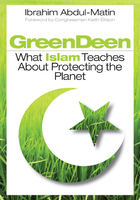
第6章 Part I Waste
Corruption has appeared on the land and in the sea because of what the hands of humans have wrought.
(Qur'an 30:41)
How do you relate to trash, to waste, to consumption? How do you understand the systems of production and consumption? Why do you consume? What do you consume? We live in a global world in which the tools and processes to sustain ourselves are all deeply connected.
A Green Deen is the choice to practice the religion of Islam while affirming the relationship between faith and the environment. As part of your personal Green Deen, for some period in your life, why not try doing without “stuff”? No more cell phones and computers, no more packaged foods, nothing bought or sold at a chain store, nothing that has an on or off switch. No more paper or pens, no more cars and exhaust, just you. Just letting go and disconnecting from “things.”
What kind of life would you have? It's okay to shrug your shoulders. A deeper question might be, What do you get out of all these things? Before we move forward, these are some critical questions to ask yourself—and it is okay if you do not have the answers. Imagine the time of the Prophet Muhammad (peace be upon him) and the simplicity in which he lived. Technologically, we've come a long way from the simple lives people lived fifteen hundred years ago, but that doesn't mean that the basic principles don't still ring true. The Prophet (peace be upon him) was a true steward of the planet (khalifah), and as the Messenger of Allah, he was the best example we have of being the khalifah, or the representative of Allah on Earth. He cared for plants and animals. He was a champion for and moved people toward justice (adl), and he advocated fairness in the marketplace. He embodied the verses (ayat) of the Qur'an in his speech, his manners, and his actions. When you think about your relationship to things, the material world, possessions, think of the greatest people—the ones we admire and honor. Did their achievements come about because of a focus on the material world or because of a focus on serving the world?
Sometimes I think we take a lot for granted. We also take the lessons of our Deen and how this tradition of ours can respond to the challenges we all face for granted. If one of the great lies of our age is that “things” give us value, then the spiritual antidote is in developing your connection to God. One of the manifestations of this great lie that “things” give us value is that we immerse ourselves in buying and consuming, no matter what the cost. What I describe as letting go of “stuff” could be considered a retreat from the world but could also been seen as a direct action to counter that great lie. Things do not define us.
Retreating from the world is something Muslims just do not do. In our Deen, our religious path, we have been taught to be present in the world, to plan for this life and for the next. But to be in this world means to understand it, to be diligent, and to be informed. When dealing with waste, the essential question is not, What is waste? The essential question is, Where does it come from?
In this section on waste, I want you to think about your relationship to “stuff” and “things.” Of course, in doing so, you have to reflect on the Oneness of God and His creation (tawhid) and how all your actions affect everything around you. How did this “stuff” and these “things” transform from natural resources into what you now own? How did this “thing” get from the manufacturer to you to the waste heaps that fill the forgotten corners of our globe? Could there be toxic waste seeping into the ground or into the air as a result of this “stuff?” Allah entrusted the Earth to us, and this trust (amana) is a sacred bond. Does our management of trash and waste represent honoring of this trust? If God ordered everything in perfect balance (mizan), does our management of waste, trash, and toxicity create imbalances?
We are all a part of this process, so it makes sense for us to educate ourselves on consumption, overconsumption, and the responses to each. I hope this section will assist you in rethinking what role you play in the trash and waste system.
Ask yourself: Where does your trash come from? Where does it go? How can you be actively involved in making the world a cleaner, less toxic place?